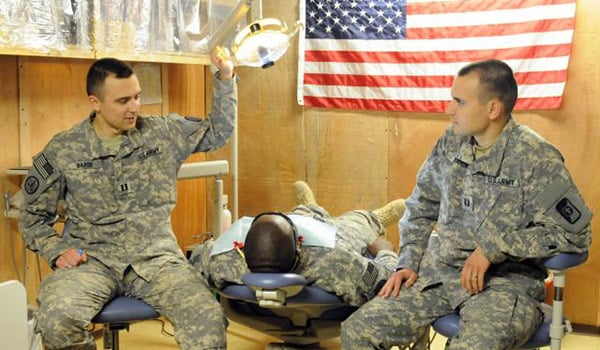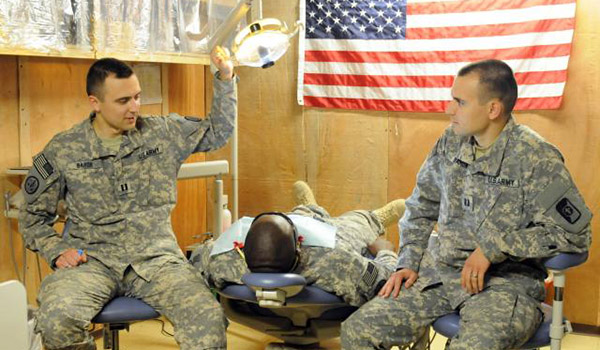
Ask the Flight Surgeon / By: CPT(P) Jessica Warneke, D.O.: Q: Hey Doc, I am supposed to have some dental work done tomorrow morning including having a tooth pulled. I’m good to fly that afternoon, right?

Photo: army.mil
FS: Unfortunately, the answer to this often-asked question is most likely “no.” Usually, a simple dental cleaning without medications or injections will not keep you from performing flight duties. However, more involved dental procedures like fixing a crown, or having cavities filled, usually requires the use of local anesthetic injections or prescription medications. Complex procedures, like extracting teeth or having a root canal, may have your dentist recommend or even require sedation or long acting anesthetics. Antibiotics may also be prescribed to treat an existing dental infection or prevent one after a procedure. Your aeromedical provider will determine if the antibiotics and other medications are allowed during flight, as well as if you are having unsafe side effects from their use. Though serious side effects of antibiotic use like allergic reactions are rare, less severe but more common consequences like nausea and diarrhea can be serious distractors in flight.
Anesthesia
Per the Army Aeromedical Policy Letters (APLs), any form of local anesthetic is automatically grounding for a minimum of 6 hours. However, if you happen to have a procedure that requires sedation it would be likely that you would be grounded for a minimum of 48 hours because of the time it takes your body to fully clear the medication from your system. Flying while you are still under the effects of local anesthetic can present a few potential problems. First, the anesthetic usually numbs a wide area of the mouth including the offending tooth, parts of the face and even the tongue. A numb face and tongue can make talking difficult, negatively affecting communication with the tower and crew. Also, you should consider that as the numbness wears off, it may uncover distracting pain. Not something you want to happen to you in the middle of a flight. Though many dentists will give medication for pain relief following the procedure, most of these meds are disqualifying for flight as they can make you sleepy and slow your ability to react. You should also consider the flight environment as some dental work may become painful with increasing altitude as the surrounding air pressure drops. Also, it is well known that vibrations from the aircraft can make pain worse. Therefore, aeromedical providers pay particular attention to the pain management of injured Soldiers when they are MEDEVAC’d. It is no different when it comes to dental pain. Imagine turbulence causing a rough flight and your painful teeth clashing together with every bump!
Bleeding
Bleeding from a procedure is also a concern in flight. Most of you have probably had a tooth pulled or dental work done where they had to pack your mouth with gauze to control bleeding. It is common for a small amount of bleeding to last for a few hours after the procedure. Not only would you not be able to talk with gauze in your mouth but talking runs the risk of moving the gauze around and knocking a clot loose causing it to bleed more. Clots can also come loose if you use a drinking straw soon after the procedure, are overly physically active after the procedure, or just messing with the area with your tongue. If that clot is dislodged within the first three days of a tooth being extracted, the wound may not heal properly, and the bone and nerves may be exposed. This is called “dry socket” and can cause intense pain that can last for many days. So, make sure to follow the instructions from your dentist on how to properly care for the wound.
Grounding
The reasons above are the most common for why you would be grounded following a dental procedure. Most of the time, recovery is very quick, and Soldiers can be returned to Full Flying Duty (FFD) within a day or two. Though expect that recovery from more involved procedures can take a more extended period, increasing the length of time that you are grounded.
Communication
There are many concerns about dental work that may impair safety in flight. Remember, AR 40-8 requires you to report all dental procedures immediately to your aeromedical provider, though the best course of action is to consult with your aeromedical provider before your dental work is performed. Do not let reporting requirements make you avoid getting your dental work done. Your aeromedical provider will consider all regulatory guidelines along with your health to make the best decision on how to keep you flying safely.
Question for the Flight Surgeon?
If you have a question you would like addressed, email it to This email address is being protected from spambots. You need JavaScript enabled to view it.; we’ll try to address it in the future. See your unit flight surgeon for your personal health issues.
The views and opinions offered are those of the author and researchers and should not be construed as an official Department of the Army position unless otherwise stated
CPT(P)(Dr.) Jessica Warneke is a flight surgeon at the United States Army School of Aviation Medicine, Fort Rucker, AL.










